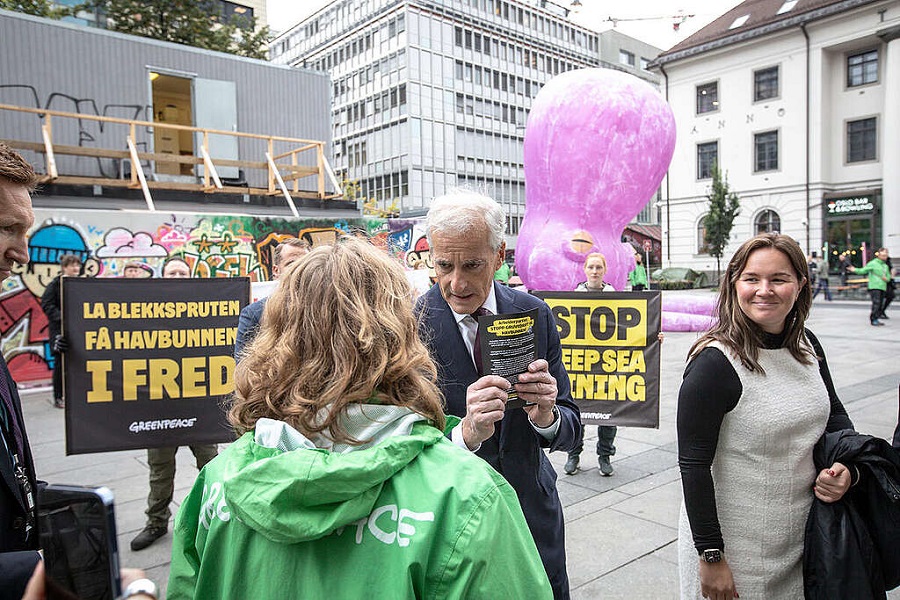11 Dec 2024

Tired Earth
By The Editorial Board

Paris held the world’s first summit to safeguard the poles and glaciers last week (8-10 November), at which host French President Emmanuel Macron stressed the importance of “putting an end to any prospect of deep-sea mining”.
France, Germany, Spain, India and Chile – a major player in the Antarctic region – signed the summit’s conclusions, dubbed the “Paris Call for the Poles and Glaciers”.
But Norway, represented by its Prime Minister, Jonas Gahr Støre, did not sign on the dotted line.
In June, the country’s parliament gave its go-ahead for a deep-sea mining mission to explore 280,000 square kilometres of seabed around the Svalbard archipelago, part of which lies in the Arctic – a move for which the country has received much criticism.
Criticism was particularly strong last week while the summit was ongoing.
Besides a call in a letter signed by around 100 EU Parliament MEPs on Thursday calling on Norway’s parliament to halt the project and accept a temporary stop to sea bed mining, NGOs presented their own letter to the prime minister at the meeting in Paris, reiterating the call, Euractiv France reported.
Big debate in Norway
“Norway is in the process of redefining its strategy. There’s a big debate in the country right now, and the authorities will not launch any new Arctic-wide deep-sea mining operations until they have evidence that the impact on the environment is low”, the French presidential office said after the summit.
“The country is not reluctant to discuss the issue,” it added, noting that “this does not mean that the country dares to commit to a moratorium at this time”.
However, this stance should not come as a surprise as Oslo has also been at odds with the EU on the issue of fishing in the polar areas for several years, arguing over the definition of fishing quotas and sovereignty over exploiting the areas surrounding Svalbard.
Krill fishing, which takes place in the Antarctic and for which Norway is the global leader, has aroused a great deal of concern among NGOs who point to the species being essential to the oceans’ food balance and note how farming the species at a wide scale makes no economic sense.
Krill is mainly fished to feed farmed fish, explains Geneviève Pons, the director-general of the Europe Jacques Delors think tank and former director of WWF Europe.
The challenge now is to “demonstrate the economic irrationality of its exploitation,” she added. “Chartering boats, equipping them with cutting-edge technology, etc. – from a cost-benefit point of view, this is far less interesting than developing insect-based food, which is more suited to the traditional diet of farmed fish such as salmon”, Pons said.
Double talk
But scientists at the summit also called for “a risk-benefit approach to the costs of cryospheric degradation”, says Pascal Lamy, vice president of the European Jacques Delors think-tank and former EU Trade commissionner (1999-2004).
And Norway, which is involved in several initiatives to protect the polar regions, is “double-talking”, says Pons, who fears this may be encouraged by the European Union.
The EU has indeed increasingly turned to its Norwegian partner for gas supplies in the wake of Russia’s war in Ukraine and doesn’t want to upset those good relations.
At the Nort Sea Summit in April, European Commission President Ursula von der Leyen declared that she was “particularly pleased that, in the years to come, Norway will maintain its high level of gas supplies”.
However, this type of ‘double speak’ worries environmental associations.
“We know that the Norwegian government is trying to use the EU to justify the construction of new oil and gas infrastructure, especially in the Arctic,” commented Gina Gylver, President of Young Friends of the Earth Norway.
Fishing relations between the EU bloc and Norway – from whom the EU currently absorbs 75% of its exports – have recently reached new heights as the two partners signed several agreements on fishing quotas and reciprocal access to waters earlier this year.
Because of this, “the most urgent priority is to translate the One Planet-Polar Summit’s leadership on cryosphere protection into political action at the COP28 in Dubai”, the NGOs concluded in their recommendations to the summit’s stakeholders.
Source : euractiv.com
Comment